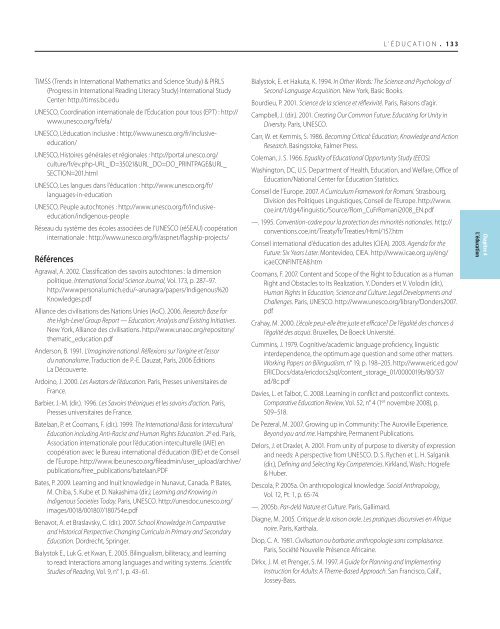Investir dans la diversité culturelle et le dialogue interculturel ...
Investir dans la diversité culturelle et le dialogue interculturel ...
Investir dans la diversité culturelle et le dialogue interculturel ...
Create successful ePaper yourself
Turn your PDF publications into a flip-book with our unique Google optimized e-Paper software.
L’éducation . 133<br />
TIMSS (Trends in International Mathematics and Science Study) & PIRLS<br />
(Progress in International Reading Literacy Study) International Study<br />
Center: http://timss.bc.edu<br />
UNESCO, Coordination internationa<strong>le</strong> de l’Éducation pour tous (EPT) : http://<br />
www.unesco.org/fr/efa/<br />
UNESCO, L’éducation inclusive : http://www.unesco.org/fr/inclusiveeducation/<br />
UNESCO, Histoires généra<strong>le</strong>s <strong>et</strong> régiona<strong>le</strong>s : http://portal.unesco.org/<br />
culture/fr/ev.php-URL_ID=35021&URL_DO=DO_PRINTPAGE&URL_<br />
SECTION=201.html<br />
UNESCO, Les <strong>la</strong>ngues <strong>dans</strong> l’éducation : http://www.unesco.org/fr/<br />
<strong>la</strong>nguages-in-education<br />
UNESCO, Peup<strong>le</strong> autochtones : http://www.unesco.org/fr/inclusiveeducation/indigenous-peop<strong>le</strong><br />
Réseau du système des éco<strong>le</strong>s associées de l’UNESCO (réSEAU) coopération<br />
internationa<strong>le</strong> : http://www.unesco.org/fr/aspn<strong>et</strong>/f<strong>la</strong>gship-projects/<br />
Références<br />
Agrawal, A. 2002. C<strong>la</strong>ssification des savoirs autochtones : <strong>la</strong> dimension<br />
politique. International Social Science Journal, Vol. 173, p. 287–97.<br />
http://wwwpersonal.umich.edu/~arunagra/papers/Indigenous%20<br />
Know<strong>le</strong>dges.pdf<br />
Alliance des civilisations des Nations Unies (AoC). 2006. Research Base for<br />
the High-Level Group Report — Education: Analysis and Existing Initiatives.<br />
New York, Alliance des civilisations. http://www.unaoc.org/repository/<br />
thematic_education.pdf<br />
Anderson, B. 1991. L’Imaginaire national. Réf<strong>le</strong>xions sur l’origine <strong>et</strong> l’essor<br />
du nationalisme. Traduction de P.-E. Dauzat, Paris, 2006 Éditions<br />
La Découverte.<br />
Ardoino, J. 2000. Les Avatars de l’éducation. Paris, Presses universitaires de<br />
France.<br />
Barbier, J.-M. (dir.). 1996. Les Savoirs théoriques <strong>et</strong> <strong>le</strong>s savoirs d’action. Paris,<br />
Presses universitaires de France.<br />
Bate<strong>la</strong>an, P. <strong>et</strong> Coomans, F. (dir.). 1999. The International Basis for Intercultural<br />
Education including Anti-Racist and Human Rights Education. 2 e ed. Paris,<br />
Association internationa<strong>le</strong> pour l’éducation inter<strong>culturel<strong>le</strong></strong> (IAIE) en<br />
coopération avec <strong>le</strong> Bureau international d’éducation (BIE) <strong>et</strong> de Conseil<br />
de l’Europe. http://www.ibe.unesco.org/fi<strong>le</strong>admin/user_upload/archive/<br />
publications/free_publications/bate<strong>la</strong>an.PDF<br />
Bates, P. 2009. Learning and Inuit know<strong>le</strong>dge in Nunavut, Canada. P. Bates,<br />
M. Chiba, S. Kube <strong>et</strong> D. Nakashima (dir.), Learning and Knowing in<br />
Indigenous Soci<strong>et</strong>ies Today. Paris, UNESCO. http://unesdoc.unesco.org/<br />
images/0018/001807/180754e.pdf<br />
Benavot, A. <strong>et</strong> Bras<strong>la</strong>vsky, C. (dir.). 2007. School Know<strong>le</strong>dge in Comparative<br />
and Historical Perspective: Changing Curricu<strong>la</strong> in Primary and Secondary<br />
Education. Dordrecht, Springer.<br />
Bialystok E., Luk G. <strong>et</strong> Kwan, E. 2005. Bilingualism, biliteracy, and <strong>le</strong>arning<br />
to read: Interactions among <strong>la</strong>nguages and writing systems. Scientific<br />
Studies of Reading, Vol. 9, n° 1, p. 43–61.<br />
Bialystok, E. <strong>et</strong> Hakuta, K. 1994. In Other Words: The Science and Psychology of<br />
Second-Language Acquisition. New York, Basic Books.<br />
Bourdieu, P. 2001. Science de <strong>la</strong> science <strong>et</strong> réf<strong>le</strong>xivité. Paris, Raisons d’agir.<br />
Campbell, J. (dir.). 2001. Creating Our Common Future: Educating for Unity in<br />
Diversity. Paris, UNESCO.<br />
Carr, W. <strong>et</strong> Kemmis, S. 1986. Becoming Critical: Education, Know<strong>le</strong>dge and Action<br />
Research. Basingstoke, Falmer Press.<br />
Co<strong>le</strong>man, J. S. 1966. Equality of Educational Opportunity Study (EEOS).<br />
Washington, DC, U.S. Department of Health, Education, and Welfare, Office of<br />
Education/National Center for Education Statistics.<br />
Conseil de l’Europe. 2007. A Curriculum Framework for Romani. Strasbourg,<br />
Division des Politiques Linguistiques, Conseil de l’Europe. http://www.<br />
coe.int/t/dg4/linguistic/Source/Rom_CuFrRomani2008_EN.pdf<br />
—. 1995. Convention-cadre pour <strong>la</strong> protection des minorités nationa<strong>le</strong>s. http://<br />
conventions.coe.int/Treaty/fr/Treaties/Html/157.htm<br />
Conseil international d’éducation des adultes (CIEA). 2003. Agenda for the<br />
Future: Six Years Later. Montevideo, CIEA. http://www.icae.org.uy/eng/<br />
icaeCONFINTEA8.htm<br />
Coomans, F. 2007. Content and Scope of the Right to Education as a Human<br />
Right and Obstac<strong>le</strong>s to Its Realization. Y. Donders <strong>et</strong> V. Volodin (dir.),<br />
Human Rights in Education, Science and Culture: Legal Developments and<br />
Chal<strong>le</strong>nges. Paris, UNESCO. http://www.unesco.org/library/Donders2007.<br />
pdf<br />
Crahay, M. 2000. L’éco<strong>le</strong> peut-el<strong>le</strong> être juste <strong>et</strong> efficace? De l’égalité des chances à<br />
l’égalité des acquis. Bruxel<strong>le</strong>s, De Boeck Université.<br />
Cummins, J. 1979. Cognitive/academic <strong>la</strong>nguage proficiency, linguistic<br />
interdependence, the optimum age question and some other matters.<br />
Working Papers on Bilingualism, n° 19, p. 198–205. http://www.eric.ed.gov/<br />
ERICDocs/data/ericdocs2sql/content_storage_01/0000019b/80/37/<br />
ad/8c.pdf<br />
Davies, L. <strong>et</strong> Talbot, C. 2008. Learning in conflict and postconflict contexts.<br />
Comparative Education Review, Vol. 52, n° 4 (1 er novembre 2008), p.<br />
509–518.<br />
De Pezeral, M. 2007. Growing up in Community: The Aurovil<strong>le</strong> Experience.<br />
Beyond you and me. Hampshire, Permanent Publications.<br />
Delors, J. <strong>et</strong> Drax<strong>le</strong>r, A. 2001. From unity of purpose to diversity of expression<br />
and needs: A perspective from UNESCO. D. S. Rychen <strong>et</strong> L. H. Salganik<br />
(dir.), Defining and Se<strong>le</strong>cting Key Comp<strong>et</strong>encies. Kirk<strong>la</strong>nd, Wash.: Hogrefe<br />
& Huber.<br />
Desco<strong>la</strong>, P. 2005a. On anthropological know<strong>le</strong>dge. Social Anthropology,<br />
Vol. 12, Pt. 1, p. 65-74.<br />
—. 2005b. Par-delà Nature <strong>et</strong> Culture. Paris, Gallimard.<br />
Diagne, M. 2005. Critique de <strong>la</strong> raison ora<strong>le</strong>. Les pratiques discursives en Afrique<br />
noire. Paris, Kartha<strong>la</strong>.<br />
Diop, C. A. 1981. Civilisation ou barbarie: anthropologie sans comp<strong>la</strong>isance.<br />
Paris, Société Nouvel<strong>le</strong> Présence Africaine.<br />
Dirkx, J. M. <strong>et</strong> Prenger, S. M. 1997. A Guide for P<strong>la</strong>nning and Imp<strong>le</strong>menting<br />
Instruction for Adults: A Theme-Based Approach. San Francisco, Calif.,<br />
Jossey-Bass.<br />
Chapitre 4<br />
L’éducation
















